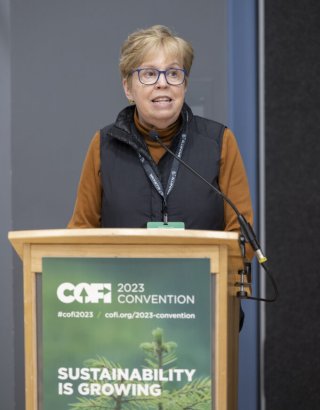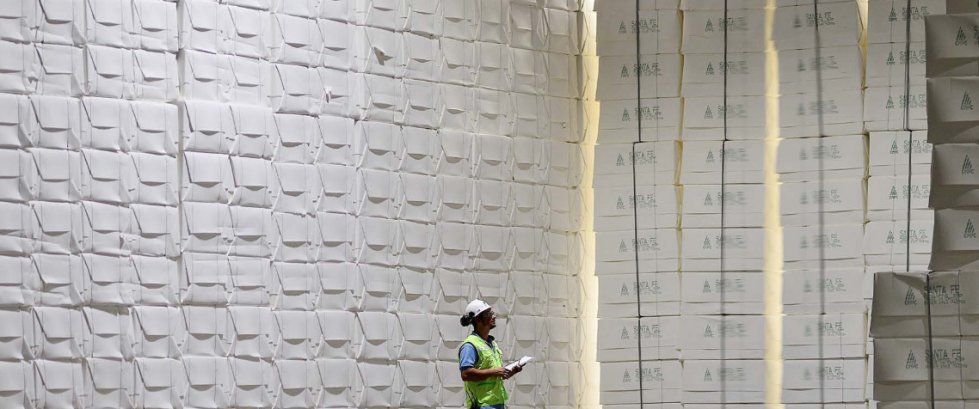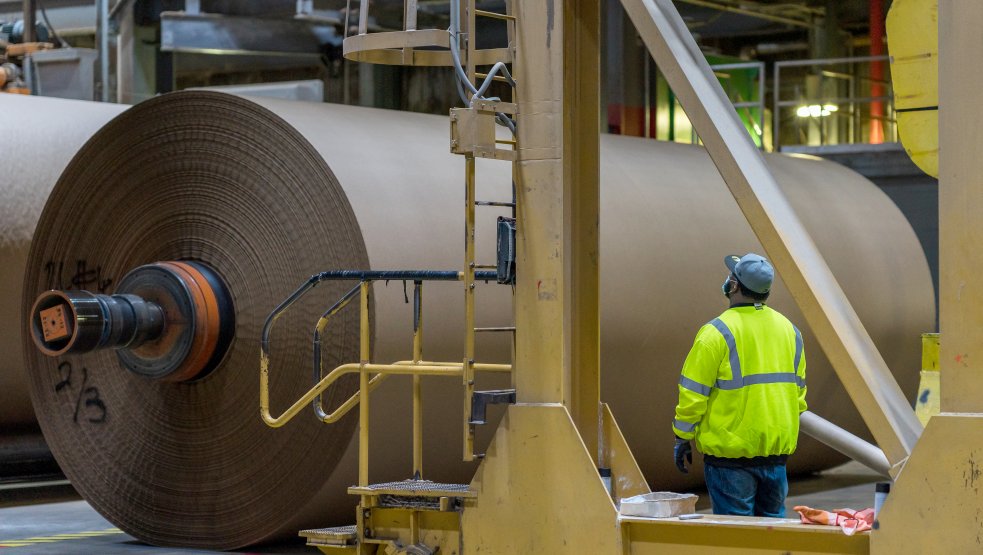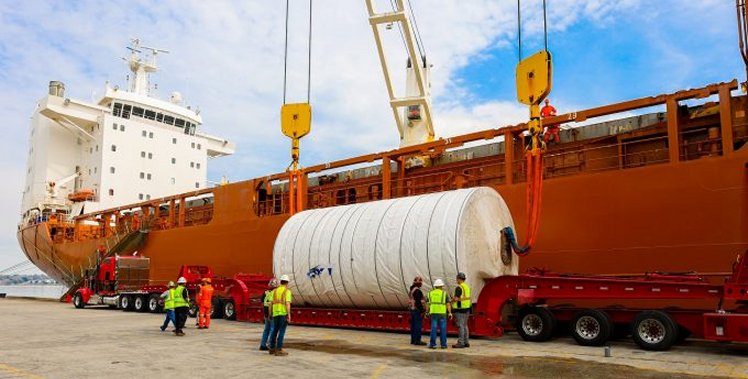BC Council of Forest Industries Urges Government to Move Faster to Stabilize Timber Supply
 May 13, 2024 – The BC Council of Forest Industries’ (COFI) President and CEO, Linda Coady, made the following statement in response to ongoing mill closures and curtailments in British Columbia, Canada: May 13, 2024 – The BC Council of Forest Industries’ (COFI) President and CEO, Linda Coady, made the following statement in response to ongoing mill closures and curtailments in British Columbia, Canada:
“Escalating closures and curtailments of lumber, pulp and paper mills in BC mean the provincial government needs to move faster to stabilize timber supply. Additional transition measures are needed within the next 60 days to address current challenges in approval and permitting systems, and changing land use policies that are leading to dramatic declines in harvest levels.
“Each time a mill closes in BC, there is a substantial direct impact on employees and their families, with further consequences for local communities as well as across supply chains. The loss of high paying jobs, local tax revenue and relocation to new employment opportunities have lasting effects in rural communities. It also creates uncertainty regarding the future of critical forest sector infrastructure and capacity in BC.
“COFI recognizes that Premier David Eby has appointed Andrew Mercier as Minister of State for Sustainable Forestry Innovation to work with BC Forest Minister Bruce Ralston to stabilize fibre supply. We urge the province to accelerate the work being done to find solutions.
“The forest industry has and continues to be one of the economic drivers in the BC economy – key to BC’s manufacturing productivity, government revenue and exports; which can be seen in COFI’s latest Economic Impact Study. Job numbers and harvest levels are highly correlated. The industry depends on timber supply (also known as fibre supply) and new investment to create jobs and produce the low-carbon products to meet growing demand for building materials and systems as well as biomaterials for energy and other renewable products.
“With dropping harvest levels, mill closures and curtailments have continued and resulted in the loss of 10,000 jobs (direct, indirect and induced) in 2023. Access to economic fibre has fallen from 60 million cubic metres in 2018 to 35 million cubic metres of actual harvest in 2023. The actual harvest in 2023 was 42 per cent below the allowable annual cut last year.
“The past few months have seen increased discussions across industry, First Nations, labour, contractors, local communities and the provincial government on what can be done to stop this trajectory and stabilize fibre supply in both the short and long term. Now is the time for additional steps to be taken to build investor confidence and ensure a long standing and foundational industry continues to benefit the province.”
The BC Council of Forest Industries (COFI) represents the majority of lumber, pulp and paper, and manufactured wood producers across the province — an industry that remains a cornerstone of the economy, supporting good jobs and a better quality of life for British Columbians. COFI advocates for the interests of its members and works with government, First Nations, communities, labour and other partners to promote a healthy, diversified and sustainable forest industry that benefits people and families across BC.
SOURCE: BC Council of Forest Industries (COFI) |
|
|

CMPC Announces Intention to Build 2.5 Million TPY Pulp Mill in Rio Grande do Sul, Brazil
April 30, 2024 - CMPC on April 29 signed an agreement with the State of Rio Grande do Sul (Brazil) on a protocol of intentions to move forward in the evaluation of a comprehensive project, which will include a new pulp mill, located 15 kilometers from the city of Barra do Ribeiro in Rio Grande do Sul.
The project, called Natureza, has an integral scope that combines industrialization, road and port infrastructure, sustainable associative forestry, conservation and cultural promotion, and involves the construction of a pulp mill with the capacity to produce up to 2.5 million tons per year of bleached short-fiber kraft pulp (BHKP) — with the possibility of subsequent expansion — in accordance with the highest world standards of environmental protection, efficiency and quality.
In line with the agreed protocol, CMPC has submitted permit applications for various monitoring activities of the Fundacao Estadual de Protecao Ambiental Henrique Luis Roessler (FEPAM), a technical agency of the Rio Grande do Sul State Environmental Protection System. Thus, specialized teams will be able to carry out the technical studies and environmental assessments required for the final preparation of the industrial project which, if all permits and authorizations are obtained, will be submitted to CMPC Board of Directors in mid-2026.
If the project is approved, it would imply an investment of approximately US$4 billion for the new industrial unit, in addition to US$420 million in various road infrastructure works and US$150 million for the development of a new port terminal in Rio Grande, as well as an expansion of the port terminal currently in use. It is not possible at this stage, to determine the economic impact of this decision, CMPC said in a written statement.
CMPC produces pulp, paper, tissue and paper products, which it sells locally and exports. With headquarters in Chile, CMPC currently has operations in Brazil, Argentina, Uruguay, Mexico, Colombia, Peru and Ecuador.
SOURCE: CMPC |
|

West Fraser Completes Sale of Its Two Pulp Mills in Western Canada to Atlas Holdings
April 22, 2024 - West Fraser Timber Co. Ltd. today announced that it has completed the sale of its Quesnel River Pulp mill and Slave Lake Pulp mill (pictured above) to an affiliate of a fund managed by Atlas Holdings following completion of customary regulatory reviews and satisfaction of customary closing conditions.
West Fraser first announced its intention to sell the two pulp mills to Atlas Holdings in September of 2023. At that time, West Fraser said the combined total cash proceeds from the sale are US$120 million.
The mills will be operated by Millar Western Forest Products, which joined the global Atlas family of manufacturing and distribution businesses in 2017.
"We would like to thank our dedicated employees for their many years of service to West Fraser and the communities of Quesnel and Slave Lake," said Sean McLaren, President & CEO West Fraser. "The sale of these two pulp assets, along with the disposition of Hinton Pulp earlier this year, enables West Fraser to focus its resources on becoming the premier building products company in North America."
Quesnel River Pulp and Slave Lake Pulp both produce Bleached Chemi-Thermomechanical pulp ("BCTMP") used to make paper products.
West Fraser Timber Co. Ltd. (TSX and NYSE: WFG) is a diversified wood products company with more than 60 facilities in Canada, the United States, the United Kingdom, and Europe. From responsibly sourced and sustainably managed forest resources, the company produces lumber, engineered wood products (OSB, LVL, MDF, plywood, and particleboard), pulp, newsprint, wood chips, other residuals, and renewable energy.
SOURCE: West Fraser Timber Co. Ltd. |
|

International Paper Announces Agreement to Acquire DS Smith
April 16, 2024 - International Paper (NYSE: IP, "IP") and DS Smith Plc (LSE: SMDS, "DS Smith") today announced that they have reached agreement on the terms of a recommended all-share combination (the "Combination"), creating a truly global leader in sustainable packaging solutions.
The terms of the Combination value each DS Smith share at 415 pence per share1, and will result in IP issuing 0.1285 shares for each DS Smith share, resulting in pro forma ownership of 66.3 percent for IP shareholders and 33.7 percent2 for DS Smith shareholders, implying a transaction value of approximately $9.9 billion3. The Combination is expected to close by the fourth quarter of 2024.
"Combining with DS Smith is a logical next step in IP's strategy to drive profitable growth by strengthening our global packaging business," said Mark S. Sutton, Chairman and CEO of IP. "DS Smith is a leader in packaging solutions with an extensive reach across Europe, which complements IP's capabilities and will accelerate growth through innovation and sustainability. We are confident this combination will drive significant value for our employees, customers, and shareholders."
CEO-Elect of IP, Andrew K. Silvernail added, "Bringing together the capabilities and expertise of both companies will create a winning position in renewable packaging across Europe, while also enhancing IP's North American business. I firmly believe this strategic combination offers a unique and highly compelling opportunity to create tremendous shareholder value. I am also committed to working with the teams to deliver the expected synergies, along with the ongoing profit improvement initiatives across the IP portfolio."
CEO of DS Smith, Miles Roberts, said, "The combination with IP is an attractive opportunity to create a truly international sustainable packaging solutions leader that is well positioned in attractive and growing markets across Europe and North America. It combines two focused and complementary businesses. DS Smith has grown significantly through a dedication to customers, focus on innovation, quality of packaging and high levels of service. In a dynamic sustainable packaging landscape, the combination will enhance our global proposition to customers, create opportunities for colleagues and drive value for shareholders who can remain fully invested in such an exciting business. I am proud of all that DS Smith has achieved to date and am sure that the business will continue to flourish as part of a combined group with IP due to the capability and continued commitment of our colleagues."
Compelling Strategic Opportunity
- Creates a global leader in sustainable packaging solutions, focused on the attractive and growing North American and European regions
- Establishes a differentiated corrugated packaging company with approximately 90% of revenue from sustainable fiber-based packaging.
- Expands IP's footprint and capabilities in the attractive European region.
- Combines DS Smith's extensive European sales of $9.4 billion4 in FY23 with IP's European sales of $1.5 billion in FY23.
- Enhances IP's business in North America's eastern region with the addition of DS Smith's complementary box network.
- Complementary business models increase vertical integration to improve profitability
- Integration of approximately 500-600k tons of containerboard from DS Smith into the IP mill system will increase the combined integration rate to approximately 90%.
- Optimizes the combined network of mills, box plants, and supply chains.
- Strengthens customer value proposition through enhanced offerings, innovation, and geographic reach
- Enhances ability to serve global customers with a highly complementary, quality portfolio and broader product offerings.
- Increases exposure to the attractive, fast-moving consumer goods and e-commerce segments.
- Greater opportunity for cross-selling products and services across respective regional and global customers.
- Combines market and commercial expertise, and innovation capabilities.
- Generates revenue synergies primarily from incremental sales generated by DS Smith's Innovation Network being extended to IP's European customers.
- Accelerates sustainability, including through innovation, for the benefit of all stakeholders
- Combines IP and DS Smith's experienced management teams to accelerate innovative sustainable solutions and advance the circular economy.
- Expands a portfolio of sustainable products to meet customers' evolving preferences.
- Aligns commitment to grow responsibly through environmental stewardship, community engagement, and strong corporate governance.
- Similar cultures and experienced teams ensure low integration and operational risk
- Shared purpose-driven cultures with a relentless focus on sustainability, responsible growth, positively impacting communities and a commitment to creating innovative solutions that meet customer needs.
- Intention to retain DS Smith's London headquarters as IP's new EMEA headquarters.
- Both the IP and DS Smith teams, including IP CEO-Elect Andrew K. Silvernail, have expertise and experience in successfully integrating large scale acquisitions.
Transaction Structure
The Combination will be structured as an acquisition of DS Smith by IP and implemented in accordance with the rules of the Code and English law. IP will issue 0.1285 for each DS Smith share, equal to 179,948,967 shares.
Upon completion of the Combination, any new IP Shares issued to DS Smith shareholders will be authorized for primary listing on the New York Stock Exchange subject to official notice of issuance. IP also intends to seek a secondary listing of its shares on the London Stock Exchange.
The Combination is expected to close by the fourth quarter of 2024, subject to IP and DS Smith shareholder approval and customary closing conditions, including receipt of regulatory clearances, in Europe and the U.S.
Governance and Leadership
Andrew K. Silvernail will be CEO of the combined company and Miles Roberts will be retained as a consultant to assist with integration matters. As part of the Combination, up to two non-executive directors of DS Smith will be invited to join the Board of the combined company upon close of the Combination.
The combined company will be headquartered in Memphis, Tennessee, with plans to establish an EMEA headquarters at DS Smith's existing London headquarters.
The full Announcement and further information is available on: International Paper's website.
About DS Smith
DS Smith is a leading provider of sustainable fiber-based packaging worldwide, which is supported by recycling and papermaking operations. It plays a central role in the value chain across sectors including e-commerce, fast moving consumer goods, and industrials. The company operates in 34 countries employing around 30,000 people and is a Strategic Partner of the Ellen MacArthur Foundation.
International Paper is a global provider of renewable fiber-based packaging and pulp products, and one of the world's largest recyclers. Headquartered in Memphis, Tenn., IP employs approximately 40,000 colleagues globally who are committed to creating what's next. The company serves customers worldwide, with manufacturing operations in North America, Latin America, North Africa, and Europe. Net sales for 2023 were $18.9 billion.
SOURCE: International Paper |
|

65 Metric-Ton Pulp-Producing Piece of Equipment Moves Through JAXPORT
Feb. 28, 2024 - JAXPORT and terminal operator Seaonus recently facilitated the move of a 65 metric-ton washer drum (equipment used for pulp manufacturing) through the port’s Talleyrand Marine Terminal in Jacksonville, Florida.
Owned by American paper and pulp manufacturer and distributor Georgia Pacific, the drum is a type of project cargo due to its large size, spanning 32 feet long and 15 feet wide. It moved from Europe to Jacksonville, Florida, onboard the Spliethoff breakbulk vessel Sampogracht and was lifted off the ship onto a special trailer used for transporting big pieces of cargo.
The drum will replace existing equipment at the company’s Brunswick, Georgia mill to produce better pulp for their global customers.
The company said JAXPORT’s diverse facilities and level of flexibility enable them to move cargo to their manufacturing facilities as quickly as possible.
“We have been moving cargo through JAXPORT for over three decades, and we have always had a level of care and attention from not only the port but also its partners that has kept us coming back year after year for our critical projects in our supply chain.” – Doug Connell, Georgia Pacific Supply Chain Manager.
Georgia Pacific operates three facilities throughout Northeast Florida and Southeast Georgia, producing household paper products, including paper towels, bath tissue, and cups.
SOURCE: Jacksonville Port Authority (JAXPORT) |
|
|